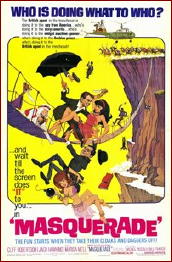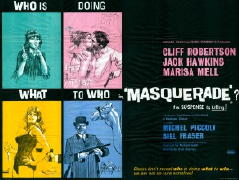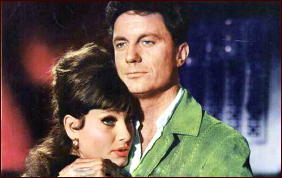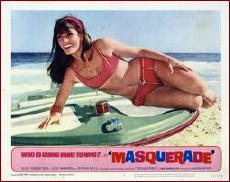Fri 10 Jul 2009
A Movie Review by David L. Vineyard: MASQUERADE (1965).
Posted by Steve under Reviews , Suspense & espionage films[15] Comments

MASQUERADE. United Artists, 1964. Cliff Robertson, Jack Hawkins, Marisa Mell, Michel Piccoli, Charles Gray, John Le Mesurier, Felix Aylmer. Screenplay: Michael Relph & William Goldman, based on the novel Castle Minerva by Victor Canning. Directed by Basil Deardon.
It’s the early sixties, and the British Lion’s bite isn’t what it once was. In the Arab state of Ramault, once liberated by the Brits in WW II, that means the treacherous leader has plans to rid himself of his nephew, the twelve year old heir to the throne, and sell out to the Russians, depriving England of those precious oil concessions.
That’s why the Brits have called in Colonel Drexel (Jack Hawkins), the man who liberated Ramault and assigned him to kidnap and protect the young prince. Drexel, a latter day T.E. Lawrence, does things his own way, and he insists on his wartime ally American David Fraser (Cliff Robertson) as his aide in protecting the prince. The government isn’t sure. Fraser has a history of financial problems and a tendency to trouble.

“Yes, David always was an Errol Flynn fan,” Drexel dryly observes, but he’ll have Fraser or no one, and Fraser needs the work. Currently he’s been reduced to posing as a male model for magazine ads.
Still, Fraser is no happier about it than the government: “Drexel, I never worked with you. I always worked for you.” But when he faces the realities he agrees to follow Drexel one more time.
But no sooner than they are set up in a villa where they bring the prince than Robertson finds himself seduced by lovely Marissa Mell and menaced by her boyfriend (Michel Piccoli) and the prince kidnapped from under his nose — all the Machiavellian work of his buddy Drexel, who after a lifetime of service to the Empire finds he is growing older and has nothing but a few ex-wives and no money to show for it. The ransom he gets for the boy will take care of that — and if that means setting up his old friend as the fall guy — well, Fraser is the adaptable sort. He’ll find a way out of it.

Now Fraser is labeled a traitor and forced to rescue the boy, who still thinks Drexel is a hero and believes Fraser set him up to save himself, but that’s not his only problem, which include Mell and her circus folk in Drexel’s employ, a pet vulture, a phony private eye, and the one question he doesn’t want answered, how far will Drexel go? To kill the boy — or him?
This clever spy spoof mixes humor with action and an unusually intelligent and quip-filled script handled by an expert cast who know their way around a dry line or a raised eyebrow. The scenery is handsome, the direction crisp, and the plot keeps twisting right up to the final scene. Robertson was born to play this sort of whimsical hero and Hawkins plays Drexel with some of the same style he brought to his role in The League of Gentleman, reviewed earlier by Steve here.

It’s based on a novel by Victor Canning, a major British thriller writer who rivaled Eric Ambler, Geoffrey Household, and Hammond Innes in his day and whose works were frequently adapted to the big and small screen, including his most famous, and atypical book, The Rainbird Pattern, which became Alfred Hitchcock’s Family Plot.
Canning’s books veered from adventure to Cold War dramas, from taut suspense to picaresque humor. Panther’s Moon, Queen’s Pawn, The House of Turkish Flies, His Bones Are Coral, The Great Affair, and Finger of Saturn are some of his better known titles.
From the catchy title tune and the animated titles, to the little twist at the end, this is a too little seen spy parody from its era, directed with a light but sure hand by Deardon and acted with wit and tongue in cheek by the entire cast.
If you’ve never seen this one and you like the better spy spoofs of the era — the best of which always seemed to be British — catch this clever and entertaining film. But don’t listen too closely to the title tune the first time you watch it. It gives away a few plot points, however unintentionally.
July 10th, 2009 at 11:55 pm
Not only have I never seen this one, I’d never heard of it until you sent me your review. Even though I went to the movies a lot back then, I think I missed out on a lot of them that were made in the 60s and 70s.
Luckily it doesn’t look as though this one will be hard to find.
July 10th, 2009 at 11:57 pm
Glad you liked the Masquerade review. It was one of those films I just stumbled on. I was sixteen in downtown Dallas and the movie I wanted to see was sold out so I crossed the street to one of the other movie palaces and bought a ticket to Masquerade — which was better than the one I wanted to see. It’s really a very well done spy spoof. I was updating some old VHS to DVD the other day and watched it again as I copied it. It’s one of those films that gets better every time I watch it.
As for Victor Canning, he really doesn’t deserve to be forgotten. His Rex Carver titles remind me a little of Dick Francis, and I love Panther’s Moon (filmed with Howard Duff and Marta Toren as Spy Hunt), about a pair of leopards being transported by train across Eastern Europe.
When they escape their keeper has to find them before they kill and battle the spies who put secret microfilm in their collars.
Quite a few of his books were filmed. Golden Salamander (with Trevor Howard), His Bones Are Coral (as Sam Fuller’s Shark), House of Turkish Flies (as House of Seven Hawks), Venetian Bird (as The Assassin), Scorpio Letter, and The Limbo Line among others.
I think one of his shorts was adapted for Hitchcock Presents and another for the Hitchcock Hour. His Queen’s Pawn about a caper on a five star liner and Finger of Saturn are both outstanding, the latter one of the most surprising endings in the literature. The official Canning site is a nice one to check out.
David
July 11th, 2009 at 12:00 am
I’ve not seen a single one of those Victor Canning movies, alas. Time to get my hunting shoes on and track them down.
— Steve
July 11th, 2009 at 9:35 am
Never heard of this one, but Mr. Deardon helmed THE ASSASSINATION BUREAU, which I always thought was one of the most stylish and entertaining films of the 60’s.
Of course, any film that stars Oliver Reed and Diana Rigg is probably worth a look.
July 11th, 2009 at 11:11 am
I second your comments on THE ASSASSINATION BUREAU, a truly underrated film if ever there was one, even without a mention of its two stars, both at the top of their game.
— Steve
July 11th, 2009 at 2:14 pm
I think we are unanimous in regard to The Assassination Bureau. Aside from Reed and Rigg, Telly Savalas and Clive Revill are also in it, not to mention a spate of fine Brit character actors.
Another one worth catching — as I’ve mentioned before — is the mod caper film The Jokers with Reed and Michael Crawford as a pair of upper class layabouts who plan a spectacular heist.
Reed was always my choice to play Flashman, which is probably why, though I love the film, Richard Lester’s Royal Flash was a minor disappointment. Both Reed and Alan Bates in it and they cast Malcolm McDowell as Flashy? A “what were they thinking” moment if there ever was one.
July 11th, 2009 at 2:58 pm
Although certainly a capable actor, Mr. McDowell was physically all wrong for the part. Where Flashy was tall, muscular, and dark-haired, McDowell was slight and light. He hardly looked capable of bullying anyone.
Mr. Reed, on the other hand, was a large and imposing figure with dark hair, who could also play vicious and dissolute pretty well.
It would have been amusing to watch Reed play Flashman’s blubbering cravenness to the hilt…
July 12th, 2009 at 8:47 am
McDowell was also miscast in the television movie of Dornford Yates She Fell Among Thieves, where he played Yates’ William Richard Chandos, a fellow who once killed a man with a single blow of his fist.
I like McDowell, but fine actor (and over actor) he is he isn’t exactly he-man material, even a he-man with a streak of yellow like Flashy. That said he is very good in Royal Flash, if not quite what I had in mind.
July 15th, 2009 at 5:01 pm
[…] the 1965 Basil Deardon film a slick spy spoof with Cliff Robertson and Jack Hawkins, reviewed here), The Great Affair, Queen’s Pawn, and the off beat Fingers of Saturn, as well as any of those […]
November 18th, 2009 at 4:50 pm
“Masquerade” is one of my very favorite films of all time – probably the best of the many spy spoofs that flourished in 1965-1968 following the worldwide Bond phenomenon. I enjoyed your review of it very much. Too bad it’s never been put on VHS or DVD, but occasionally it gets a showing on TCM and luckily, I have a bootleg DVD in my collection so I can watch it when I want.
PS – It opened on May 19, 1965 in Dallas at the Village first run and played three weeks. It later played a week (September 1-7, 1965) at the Casa Linda and Preston Royal theaters on a double bill with “The Sons of Katie Elder.”
July 19th, 2013 at 11:27 am
Hiya,
I have a copy of this film with russian voice overs – can still hear the english in the background but not particularly well. I live in the spanish town where Masquerade was filmed and so I’m particularly interested in getting the original soundtrack (in english). Can anyone help ???
Malc
August 3rd, 2013 at 1:29 am
Masquerade is available from Amazon.com in a pairing with another Cliff Robertson film, 633 Squadron. The disc is all-region. Picture and sound quality are excellent. There are no extras of any kind, though.
August 3rd, 2013 at 9:07 am
Andrew
Good to know. Thanks for the info!
Steve
February 18th, 2017 at 6:50 pm
One of my favourite movies. But this is the first time I noticed, how self conscious Cliff Robertson’s performance is.
It was interesting to see Jack Hawkins and Charles Grey in the same movie. When Hawkin’s
lost his voice through cancer the following year (1966). Grey was one of the actors who dubbed him.
My favourite Grey performance is in “The Devil rides out”
I too am a fan of Victor Canning’s books. Although I’m not sure how many I’ve read.
It might just be one, and that’s a long time ago.
August 23rd, 2023 at 8:18 am
Small correction. You talk about The House of the Turkish Flies. You are conflating two Victor Canning books, The House of the Seven Flies, filmed as The House of the Seven Hawks, and The Man from the Turkish Slave, never filmed.
But I like what you say about these films.